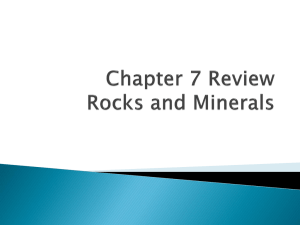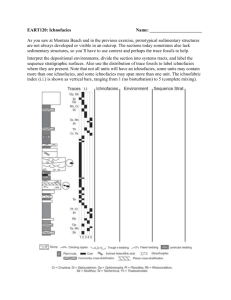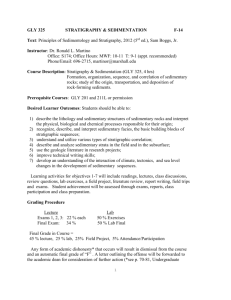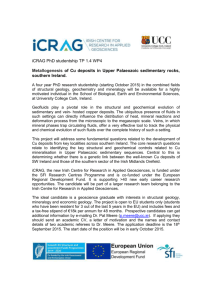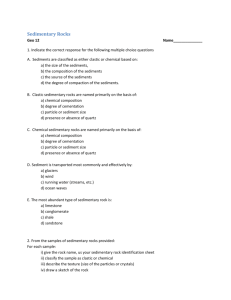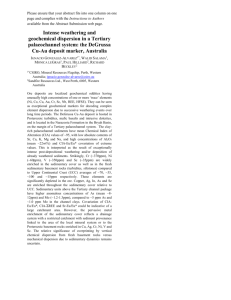g240papr
advertisement
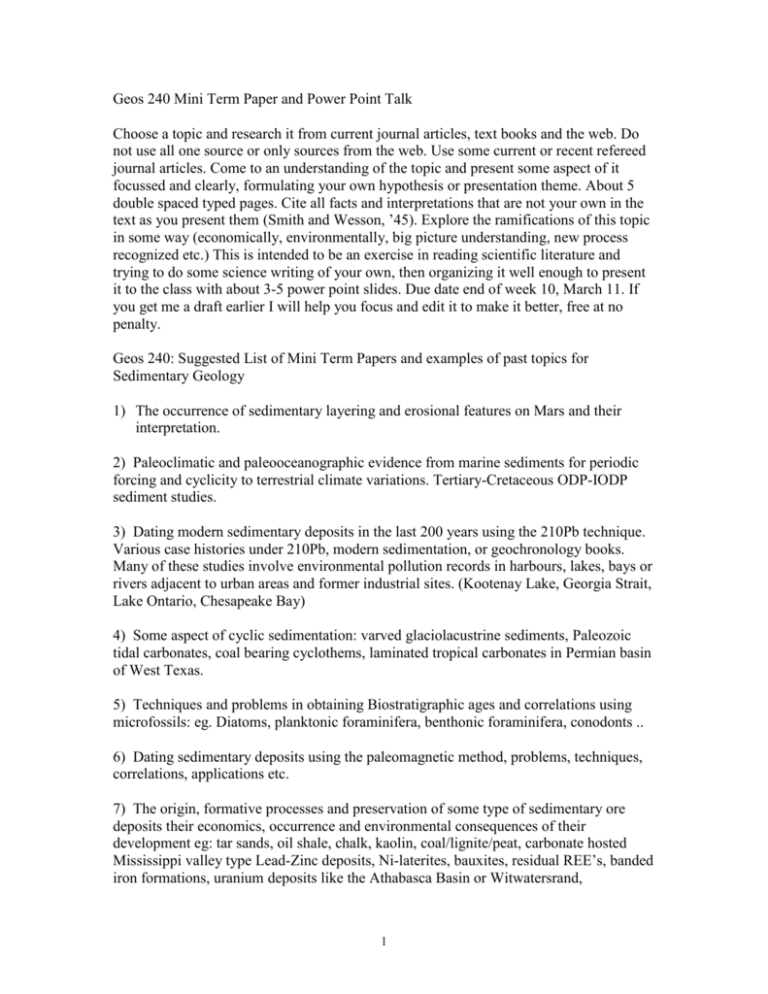
Geos 240 Mini Term Paper and Power Point Talk Choose a topic and research it from current journal articles, text books and the web. Do not use all one source or only sources from the web. Use some current or recent refereed journal articles. Come to an understanding of the topic and present some aspect of it focussed and clearly, formulating your own hypothesis or presentation theme. About 5 double spaced typed pages. Cite all facts and interpretations that are not your own in the text as you present them (Smith and Wesson, ’45). Explore the ramifications of this topic in some way (economically, environmentally, big picture understanding, new process recognized etc.) This is intended to be an exercise in reading scientific literature and trying to do some science writing of your own, then organizing it well enough to present it to the class with about 3-5 power point slides. Due date end of week 10, March 11. If you get me a draft earlier I will help you focus and edit it to make it better, free at no penalty. Geos 240: Suggested List of Mini Term Papers and examples of past topics for Sedimentary Geology 1) The occurrence of sedimentary layering and erosional features on Mars and their interpretation. 2) Paleoclimatic and paleooceanographic evidence from marine sediments for periodic forcing and cyclicity to terrestrial climate variations. Tertiary-Cretaceous ODP-IODP sediment studies. 3) Dating modern sedimentary deposits in the last 200 years using the 210Pb technique. Various case histories under 210Pb, modern sedimentation, or geochronology books. Many of these studies involve environmental pollution records in harbours, lakes, bays or rivers adjacent to urban areas and former industrial sites. (Kootenay Lake, Georgia Strait, Lake Ontario, Chesapeake Bay) 4) Some aspect of cyclic sedimentation: varved glaciolacustrine sediments, Paleozoic tidal carbonates, coal bearing cyclothems, laminated tropical carbonates in Permian basin of West Texas. 5) Techniques and problems in obtaining Biostratigraphic ages and correlations using microfossils: eg. Diatoms, planktonic foraminifera, benthonic foraminifera, conodonts .. 6) Dating sedimentary deposits using the paleomagnetic method, problems, techniques, correlations, applications etc. 7) The origin, formative processes and preservation of some type of sedimentary ore deposits their economics, occurrence and environmental consequences of their development eg: tar sands, oil shale, chalk, kaolin, coal/lignite/peat, carbonate hosted Mississippi valley type Lead-Zinc deposits, Ni-laterites, bauxites, residual REE’s, banded iron formations, uranium deposits like the Athabasca Basin or Witwatersrand, 1 volcanic/sediment hosted massive sulfide deposits VMS-SMS, placer gold, diamonds, titanium or PGE deposits, residual deposits, bauxite, coltan, REE’s in soils, Evaporitessalts: halite, sylvite, gypsum, borax, nitrates etc, . 8) Seismic stratigraphy and seismic facies as tools for exploration and sequence stratigraphy a la Peter Vail of Exxon. 9) Ground water pollution and remediation measures in sedimentary aquifers: (salt incursion, chemical pollution, radionuclide pollution of vadose zone aquifers like beneath the Colombia River Plateau, Richland/Hanford. 10) The controlling factors of oil and gas deposits in sedimentary basins: source rocks, kerogen types, thermal maturation, migration, porosity (primary and secondary), trapping, permeability stratigraphic versus structural traps etc. A case history for a particular sedimentary basin or play: Cook Inlet Alaska, The Devonian Reef Trends of Western Canada. 11) The recognition of sedimentary facies and assemblages in the interpretation of past geologic environments eg: ophiolites, volcanic arcs, carbonate platformal assemblages, continental basins, rift basins, eugeosynclines etc. The Cretaceous interior Seaway of N Am, Sedimentary basins of the Tethy’s Alpine system, Flysch versus Molasse sedimentation. 12) Sedimentary geological evidence for cyclic fluctuation on a terrestrial scale between ice house and greenhouse states, snowball earth a la Derek York, Paul Hoffman etc. 13) Chemical stratigraphy and chemical correlation markers for sediment dating in modern active sedimentary environments, ponds lakes estuaries eg. Environmental metals like Pb, Zn, Hg, dioxins, PAH’s. Howe Sound, Kitimat etc. 14) Sediment properties and controls on terrestrial or sub-aqueous landslide deposits, slumps, liquefaction of foundation materials, catastrophic mass movements of unconsolidated soils: density, water content, porosity, drainage, slope , mineralogy, particle size. Use a specific case like the landslide at Turnagin heights Alaska in the 1964 Prince William sound quake, the sinking of buildings in Mexico city during the big quake last decade, the mega slump off of Hawaii. 15) Sedimentary evidence for past earthquakes and seismicity: seismites, co-seismic deformation, facies changes, downdropped shorelines, flooded marshes, base level changes, massive slumps and disturbed liquefied sediments etc. 16) Tsunami deposits, their character, where and when they occur, the record of past great earthquakes, forward modeling to predict tsunami size for different near shore settings. Evidence for co-seismic subsidence from sedimentary facies successions. 2 17) Marine pyroclastic deposits, the nature of the marine volcano-sedimentary record, volcanoes versus volcanic basins, extent, contribution to arc sedimentation, ore forming environments, examples from modern arcs. (Marianas ) Contribution to past volcanosedimentary successions. Is the present like the past? (Abitibi) 18) Contrasting sediment types and proportions in different deep sea trenches. Relationship to age of seafloor, proximity to arc, continental margin open ocean etc. Contrasts in tropic trenches to high latitude ones. How do trenches relate to accretionary margins? Are there any preserved ancient trench sequences, why or why not? 19) Early diagenesis and cementation in sedimentary deposits. 20) Stratigraphy of a long occupied archeological site. 21) A geophysical study of some sedimentary or resource deposit involving seismic, potential fields or well logs and physical properties. 22) Gas Hydrate deposits, where do they occur, how much is there? 23) Turbidites, origin, mechanism, facies, ignition, depositional sites. 24) Unconformity bounded sequences and their significance for the Geological Time Column. Example Format: Title: Analysing and Unraveling the Stratigraphic Evidence for the Cause of the K-T Boundary Massive Extinction Event Abstract: The major fossil changes between end of Cretaceous (Maastrichtian) and beginning of Tertiary (Paleocene) are set out in terms of the sites and sedimentary sequences they come from. Particular attention is paid to clastic successions and their sequence stratigraphic framework as well as the details of their dating and the ties to the alternative markers for Deccan Traps Volcanism versus the Chixulub Bolide Impact as recorded in the Americas. By careful stratigraphic analysis and interpretation, the Boilde event seems to predate the boundary extinction by some tens of thousands of years and the markers of shocked quartz and microtektites can be seen to be reworked upsection. In contrast the Ir, Os and isotope anomalies can be readily correlated to the Deccan plume head volcanism now redated more precisely to the KT boundary. Introduction: Review of evidence laid out in the Original papers for each contending hypothesis. Blah blah blah. Alvarez (1995) etc said…. New Data, Methods and Stratigraphic Information: Table of revised ages versus biostratigraphic chronozones. 3 Figure showing location of Chixulub, Deccan Traps and locations of key stratigraphic sections Text Conclusions: Discussion: Synopsis, unresolved issues, the bottom line for this new reinterpretation. Caveats (I was incapacitated when I did the research but wrote it up anyway!) References Cited: Alvarez, L. (1995) Pipedreams regarding the KT Boundary Extinction. Journal of Geophantasy, Vol 1, p1-12. Etc And 3-5 power point slides to make these points in a class presentation March 11! 4
